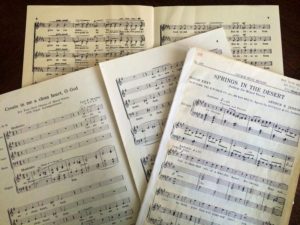Come to the Waters
Lesson Seven

Streams of Mercy—Forgiveness
Scripture: Isaiah 35:1–2, 5–7; Psalm 51:1–12; Matthew 6:12
(Blog inspiration includes all of Isaiah 35)
 I was blessed to grow up in a community of faith that supported a strong music program. At Oak Cliff Presbyterian Church in Dallas, Texas, choirs played a huge part in the spiritual formation of the children, youth, and adults within and beyond the walls of the building. I will always be grateful for the directors and musicians who opened the Word that I came to learn “by heart” by singing and hearing classic choral pieces.
I was blessed to grow up in a community of faith that supported a strong music program. At Oak Cliff Presbyterian Church in Dallas, Texas, choirs played a huge part in the spiritual formation of the children, youth, and adults within and beyond the walls of the building. I will always be grateful for the directors and musicians who opened the Word that I came to learn “by heart” by singing and hearing classic choral pieces.
Whenever I read the three texts from this month’s lesson, I don’t simply read words—I hear choir voices from years past echoing within. I confess that as a child and teenager listening to, and later singing, these words, I was rarely aware of the source of the lyrics. But when a young tenor named Rob Cunningham opened his mouth and the words from Isaiah 35 in the anthem “Springs in the Desert” poured out, the Holy Spirit was in the midst of the singing as well as the hearing. Tears still come to my eyes when I hear/read/sing these words that assure us of God’s presence and promise, “Say to them that are of a fearful heart, ‘Be strong, fear not; Behold, your God will come and save you,’” followed by other voices joining in harmony, painting a picture of God’s vision of a new way of life, “The wilderness and the solitary place shall be glad, and the desert shall rejoice and blossom as the rose. For in the wilderness shall waters break out, and streams flow in the desert.” The vision continues with God’s bold statement, “the ransomed of the Lord shall return with songs and everlasting joy,” and closes in whispered words that repeat the promise over and over again, “sorrow and sighing shall flee away.’’
Each time I read the words of our second text, Psalm 51, in verse 10, I hear the hushed tones of a simple and soulful prayer as the Psalmist and singers plead, “Create in me a clean heart, O, God, and put a new and right spirit within me.” You can feel the weight of the burden the Psalmist carries and you are able to connect with, and claim, the prayer as your own.
Our third scripture, one verse from Matthew 6 that many of us pray each Sunday in corporate worship as part of the Lord’s Prayer, takes on an additional intensity when put to music. In Albert Hay LaMotte’s anthem, when the vocalist pleas to God to “forgive us our debts,” our heartbeats quicken as the tempo accelerates, only to slow down with the words, “as we forgive our debtors.” The Italian word “rallentando” in this section of the music refers to a gradual dying away or letting go. It is a call to release whatever we are holding. Perhaps the musical notation is a reminder for all of us as we approach the subject of forgiveness this Lenten season. A dying away of old habits and hurts, a letting go, a release. Rallentando.
I have spent a good deal of my energy in the past 18 months letting go of physical possessions. Last Lent, we started a weekly group at church to support one another in the process of “decluttering.” I called the series “Lessoning: The Spiritual Practice of Letting Go.” At the end of the Lenten season, the group was not ready to disband so we chose to continue on a monthly basis to encourage and inspire one another. It’s been a year now and one observation we’ve made is that through the process of letting go of unnecessary physical possessions, we are also letting go of unnecessary inner burdens, such as guilt, grief, and even anger. As our outer world becomes less encumbered, our spirits grow lighter and more liberated. While each person is on her or his own journey, we each carry a vision of where we hope to go. We spend time imagining how it would be to open a closet or cabinet without the fear of stuff falling out. We visualize how it would feel to walk into a room that has no stacks of papers or miscellaneous items strewn about. We envision how freeing it might feel to have clear spaces in which to dream, to own only what we treasure or find useful at this point in our life; letting go of the past so that we might more freely move into God’s present. When we practice letting go, we ask ourselves if the item (or attitude) supports the vision we have for our life. If it does not, we thank it for the part it played and we release it. (For more on this idea, read The Life-Changing Magic of Tidying Up, by Marie Kondo.) Rallentando.
Similarly, in our lesson this month, Judy Fletcher wrote of the importance of having a vision of forgiveness. Holding a vision of a new way of life helps us stay present to God’s presence right now as it helps us move forward. Holding a vision of a clean heart, of open and empty spaces, of a parched land filled with pools of water, gives us courage as we seek forgiveness for ourselves or as we seek to forgive someone who has wronged us in some way. It is hard work. Just as we might want to hold onto a pair of size 5 jeans that fit us forty years ago simply to prove that we used to be small, we might also want to hold on to an old grudge to prove that we were “right” and that someone else was “wrong.” But when we hold on to the old, there is no space for the new. In Isaiah 43:19, we read God’s word to us, “I am about to do a new thing; now it springs forth, do you not perceive it? I will make a way in the wilderness and rivers in the desert.”
We yearn to be free of the burden of an unclean heart. We long for our inner counters, cupboards, and closets to be cleared of unnecessary “stuff”, but may find it hard to move from theory to practice. It is helpful to remember that forgiveness is a process, whether we are accepting forgiveness as God’s gift or forgiving someone else. It is not a one-time action but a daily spiritual practice. In addition to the excellent lesson that our author has offered, I point to the resources she suggests for further study and reflection at the end of the lesson. I especially lift up the sections on forgiveness in Dorothy Bass’s Practicing Our Faith and Parker Palmer’s Let Your Life Speak. Each of these books has been life-changing and life-giving for me.
I also commend to you anything written by the late Lewis Smedes. If you can find a copy of the video series Wrestling With Angels (perhaps tucked away in your local presbytery resource center) distributed by Zondervan Publishing House, you will be richly blessed. In the segment of the video on Forgiveness, Lewis Smedes ends with these words, and so do I:
“In the long run, forgiveness is the only remedy for pain you didn’t have coming or pain you cannot get rid of. You forgive someone, and you begin to dance instead of wallow. You begin to walk with God. You ride the cosmic crest of love. You set the prisoner free, and you discover that the prisoner you set free is you.”
With love and a grateful heart…
Jo Ann Currie
Director of Christian Education & Spiritual Formation
First Presbyterian Church, Pasadena, Texas
